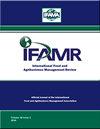Typology and performance of inter-organizational relationships among Ghanaian farmers
IF 1.5
4区 经济学
Q3 AGRICULTURAL ECONOMICS & POLICY
International Food and Agribusiness Management Review
Pub Date : 2021-12-16
DOI:10.22434/ifamr2020.0170
引用次数: 0
Abstract
This study explored inter-organizational relationships (IOR) between farmers and agri-food processors in Ghana and their relative effect on participating farmers’ performance. The IOR were organized into three broad types: governance (formal/informal); orientation (price/quality/quantity); and structure (direct-to-buyer/farmer-based organization (FBO)/agent). The study showed that about 44% of farmers participated in IOR, and 72% of them use direct-to-buyer relationships compared to 25% and 5% who use FBO and agent. The total exceeds 100% because some farmers used multiple IOR structures. Likewise, more than half of farmers involved in IOR use multiple orientations, with 29%, 81% and 54% of them using orientations involving quantity, quality, and price specifications, respectively. Formal governance IOR accounted for 31% of IOR by governance. On performance, the average farm income of farmers involved in IOR was GHS 3,947, which was 3.1 times higher than non-IOR farmers, and those with formal arrangements had 6.4 times higher average farm income than farmers in informal relationships. IOR with formal governance and quality-price orientation presented positive and statistically significant effects on marginal benefits while producer demographic and socio-economic characteristics did not. These results provide instruction for policymakers and practitioners in helping inform farmers’ participation in IOR that produce superior outcomes.加纳农民组织间关系的类型与表现
本研究探讨了加纳农民和农业食品加工商之间的组织间关系(IOR)及其对参与农民绩效的相对影响。IOR被分为三大类:治理(正式/非正式);方向(价格/质量/数量);结构(直接面向买方/农民的组织(FBO)/代理)。研究表明,约44%的农民参与了IOR,其中72%的农民使用直接与买家的关系,而使用FBO和代理的比例分别为25%和5%。由于一些农民使用多个IOR结构,总数超过100%。同样,参与IOR的农民中,超过一半的人使用多种导向,其中29%、81%和54%的人分别使用涉及数量、质量和价格规格的导向。正式治理IOR占治理IOR的31%。在绩效方面,参与IOR的农民的平均农场收入为GHS 3,947,比非IOR农民高3.1倍,而有正式安排的农民的平均农场收入比有非正式关系的农民高6.4倍。具有正规治理和质量-价格导向的IOR对边际效益有显著的正向影响,而生产者人口特征和社会经济特征对边际效益没有显著影响。这些结果为政策制定者和从业者提供了指导,以帮助农民参与产生更好结果的IOR。
本文章由计算机程序翻译,如有差异,请以英文原文为准。
求助全文
约1分钟内获得全文
求助全文
来源期刊

International Food and Agribusiness Management Review
AGRICULTURAL ECONOMICS & POLICY-
CiteScore
2.90
自引率
0.00%
发文量
0
审稿时长
>12 weeks
期刊介绍:
The IFAMR is an internationally recognized catalyst for discussion and inquiry on issues related to the global food and agribusiness system. The journal provides an intellectual meeting place for industry executives, managers, scholars and practitioners interested in the effective management of agribusiness firms and organizations.
IFAMR publishes high quality, peer reviewed, scholarly articles on topics related to the practice of management in the food and agribusiness industry. The Journal provides managers, researchers and teachers a forum where they can publish and acquire research results, new ideas, applications of new knowledge, and discussions of issues important to the worldwide food and agribusiness system. The Review is published electronically on this website.
The core values of the Review are as follows: excellent academic contributions; fast, thorough, and detailed peer reviews; building human capital through the development of good writing skills in scholars and students; broad international representation among authors, editors, and reviewers; a showcase for IFAMA’s unique industry-scholar relationship, and a facilitator of international debate, networking, and research in agribusiness.
The Review welcomes scholarly articles on business, public policy, law and education pertaining to the global food system. Articles may be applied or theoretical, but must relevant to managers or management scholars studies, industry interviews, and book reviews are also welcome.
 求助内容:
求助内容: 应助结果提醒方式:
应助结果提醒方式:


